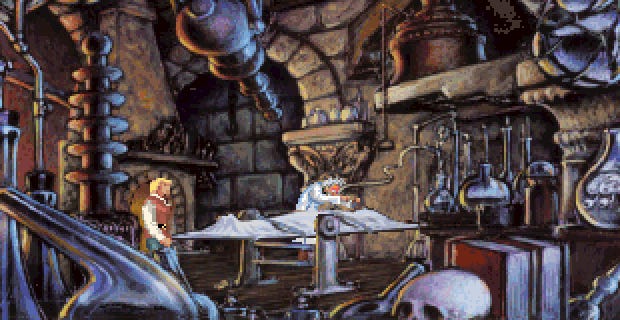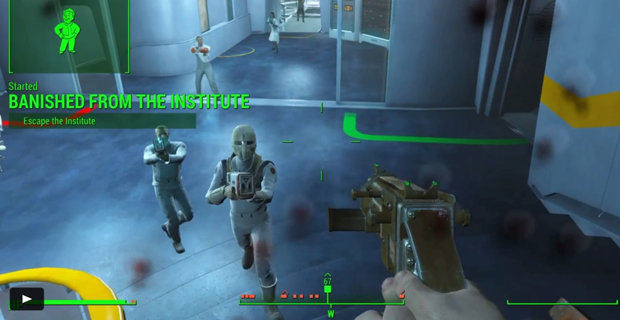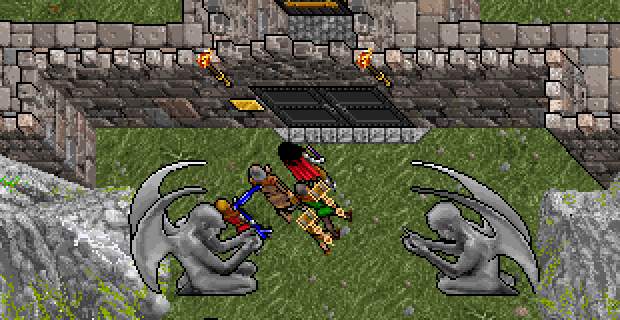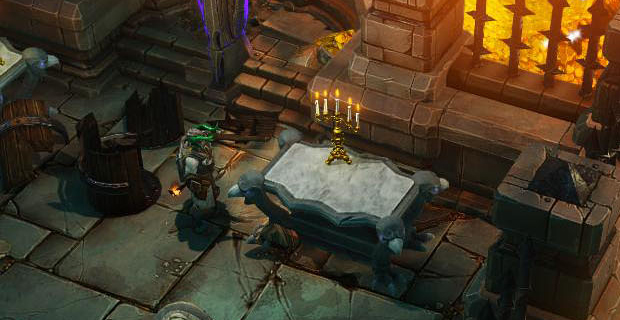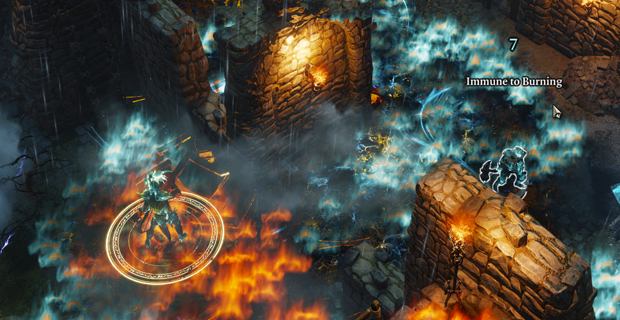The RPG Scrollbars: The genius in the inventory
The Psychopath's Toybox
I forget which game it was, exactly. If I had to pick one, I'd say probably the text adventure Humbug. It doesn't really matter, as it's not really the game's fault, but I still remember the sadness of being told to go into the inventory and realising that while I was thinking of a big room full of bubbling liquids in interesting flasks and other cool science stuff, the game was actually saying 'look in your pockets'. Especially as if it was Humbug, it's a game about wandering around and exploring your crazy inventor grandfather's house. I must have searched for whole minutes, back in 1990.
There's never been a game that really harnessed that desire, but still, it explains a lot about one of my favourite things in RPGs - particularly those of the early 90s - that the inventory often was a place to experiment rather than simply pluck the correct item at the correct time. Even if then, as now, it's often been more accident than design.
Now, I am not talking crafting. Heroes. Don't. Craft. I'm thinking of more a general sense of cleverness, invention and mad ideas allowed by the rules of the game and in particular your gathered equipment, where exploring and experimenting leads to the world feeling more complex, more interesting, and more pliable, without blocking everything off with the local equivalent of "I can't do that," or the hand of the programmer coming in to smack away an interaction with an out of context 'nope'.
In particular, I'm thinking of the way that a good RPG tends to be a mess of interlocking systems, with the emphasis firmly on 'mess'. Unlike a traditional adventure, there are simply too many interactions and situations to be hard-coded. Unlike most other games, the genre's demand for interesting items, skills and spells constantly magnifies the scope for stuff to be overlooked, for good or bad. Often it's in things being overlooked that interesting stuff happens. For example, take Deus Ex, and how it's officially impossible to do a no-kill run because the plot demands you kill baddie Anna Navarre either at Point A or Point B. However, because the AI has the ability to open any door, it's possible to raise an alarm, have someone else open the one she's guarding, and blitz out. In my favourite ever example, Two Worlds, the villain spends most of his time standing near the starting village, pretending to be your mentor. He's too tough to beat up personally, but there's nothing stopping you kiting him over to some other folks and finishing the game in literally two minutes. When rule is overlaid on rule overlaid on rule, unexpected situations - 'edge cases' to use the design parlance - are rife.
And of course, frequently awesome.
Inevitably, Ultima VII - take a shot - has some of my favourite examples. As much as we deservedly praise its world simulation, I think we can all agree that the real goal of Ultima VII has nothing to do with defeating the Guardian and everything to do with breaking Britannia over one knee. Oh, the possibilities! Making ladders out of crates to sequence break. Avoiding penalties for stealing by smashing the cases things are in, apologising profusely when caught, then casually wandering back later to take all the stuff that used to be inside them. So many powder kegs...
And of course, the true game-breakers - the ability to pour poison down any enemy's throat just by clicking a vial on them, or send anything from a guard to a dragon into a screaming tizzy by using a soiled diaper on them. Diapers that you can gather in infinite supply in Lord British's castle, and 'arm' with a trip to the nursery. Clearly unintentional, but convenient! And all it took was someone not being too specific about only being able to feed things to friendly people or dragons being a bit above such things.
But I don't count this as a bug. I love when NPCs have to follow the rules, and the rules are actually applied. I hate for instance knowing that if I'm given some spell called "Death's Deadly Cloud Of Instant Death", every boss in the game is going to simply no-sell it because fuck you, that's why. If you don't want me casting that spell, then either don't put it in the game in the first place, or give me a really good reason. I will happily accept a fireball spell doing nothing against a fire elemental. Against some regular dude, I expect a HP meter falling faster than Top Gear's ratings.
Fallout for instance really went above and beyond here, with fans quickly learning two amazing tricks - reverse pickpocketing, and healing to death. Reverse pickpocketing is the art of taking a bomb, activating the timer, quietly shoving it into someone's trousers, and then getting the hell out of Dodge before it explodes. As long as you're not on the map when it happens, you can return with the relevant character quietly assassinated and nobody any the wiser. Hurrah! Or alternatively, you can use a quirk of the stock health-giving Super Stimpaks. They immediately heal for a ton of points, but at the cost of a metaphorical kick in the balls a couple of minutes later. A canny player can therefore just pump their target full of them, stand back, and watch as they collapse dead. Neither of these tricks was ever presented openly to the player, but were simply clever ideas based on looking at the rules and going "Hmm..."
(Reverse pick-pocketing was of course later added to Fallout 3, complete with an achievement. Rather taking the fun out of things in my book, but... well, there you go. It's at least easier to do subtly as long as you don't get caught in the act. The same mechanic also allows for forcing NPCs to wear specific armour, though you take a karma hit even if you're doing them a favour - one of many reasons that karma reaaaaaaaaaally doesn't work in that game...)
Over time though, the march has been pretty definitively towards trying to avoid this kind of thing, with the major exceptions we see being the game-breaking variety rather than immersion-boosting 'of course it works' flavour of cool inventory items. Speedrunners for instance habitually use tricks like being able to stick an item through a wall in Bethesda games to jump 'out of bounds' and ignore vast chunks of the game, or more overt stuff, like how Morrowind's alchemy neglecting to prevent potions improving your, uh, alchemy, made it possible to become godlike in just a couple of minutes, or how items in the air can be used as steps in Oblivion. And that's cool, obviously, but not quite the same as when exploring the real-world potential of something like Deus Ex's LAM or Hitman: Blood Money's magic coin. For me, part of the charm of the examples here isn't their cheating potential, but the fact that they feel like clever, actual uses for items that you might have - like you're some fantasy MacGuyver, figuring out that with your strength mod, you can avoid the fight that the designer wanted you to have and build a set of stairs with those crates in the corner, or that blinding the basilisk with a custard pie will prevent its petrifying gaze. (An actual example from Nethack, as in The Dev Team Thinks Of Everything).
And let's not even get STARTED on Dwarf Fortress.
Easily my favourite modern successor to all of these games was Divinity: Original Sin, which both set about doing the Ultima VII thing and making a world that would be bulletproof even in a multiplayer setting. The easiest way of doing this would have been to lock everything down. Instead, it opted to make it so open that you can just murder everyone and still progress. Some of the tricks allowed in beta were patched out, like being able to teleport any item out of a locked building and just pick it up. Most though stayed, like having one character distract an NPC while another stole everything in their house, making you feel like an expert grifter rather than just adventurer, or playing with rules like trying to knock down a locked door dealing weapon damage by just repeatedly hitting it with fire. As before, the bosses weren't given any special immunities to most of this stuff. You could quite easily set traps or yoink them out of their intended combat area, with even the developers surprised when one player saved an item called the Lava Core for the final boss and one-shotted it.
I've yet to play much of the sequel - like most of this year's, I have the Early Access version, but prefer to wait until It Is Done. But as you can probably imagine, I'm looking forward to it. It's the first RPG since that quiet afternoon playing Humbug that really feels like it's going to embrace the creativity and bastardry that I want from my RPG systems. Tricking another player into drinking poison at a crucial moment by taking a poison potion, colouring it red with some dye, and reverse-pickpocketing it into their bag? That's the kind of game I want to play, to say nothing of having much more scope to try messing with the scripts with spells and triggered items and things on timers. Hopefully it'll do it well and inspire more to try similar - to flesh out worlds in terms of opportunities and situations rather than simply flags and collectibles. Unlikely, I know. But hey, if the next Dragon Age or Witcher or big AAA attempt even tries to sprinkle a little chaos into an increasingly tiresomely locked down genre, I reckon we all win.
